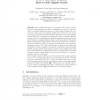11 search results - page 1 / 3 » Simple Adaptive Oblivious Transfer without Random Oracle |
ASIACRYPT
2009
Springer
13 years 11 months ago
2009
Springer
Adaptive oblivious transfer (adaptive OT) schemes have wide applications such as oblivious database searches, secure multiparty computation and etc. It is a two-party protocol whic...
EUROCRYPT
2007
Springer
13 years 11 months ago
2007
Springer
We study an adaptive variant of oblivious transfer in which a sender has N messages, of which a receiver can adaptively choose to receive k one-after-the-other, in such a way that ...
EUROCRYPT
2001
Springer
13 years 9 months ago
2001
Springer
Abstract. We consider the question of protecting the privacy of customers buying digital goods. More specifically, our goal is to allow a buyer to purchase digital goods from a ve...
SCN
2008
Springer
13 years 4 months ago
2008
Springer
We present an implementation of the protocol of Lindell and Pinkas for secure two-party computation which is secure against malicious adversaries [13]. This is the first running sy...
PKC
2009
Springer
14 years 5 months ago
2009
Springer
We explore the security of blind signatures under aborts where the user or the signer may stop the interactive signature issue protocol prematurely. Several works on blind signatur...

